|
|
|
Sort Order |
|
|
|
Items / Page
|
|
|
|
|
|
|
| Srl | Item |
| 1 |
ID:
099123
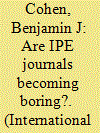

|
|
|
| 2 |
ID:
099109
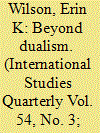

|
|
|
|
|
| Publication |
2010.
|
| Summary/Abstract |
The world's religions have strong traditions of contributing to theories and practices around justice. Recent debates on global justice within International Relations (IR), however, have largely overlooked possible contributions from religion. This article explores why religion is neglected, despite its potential for constructive involvement in the pursuit of global justice. I argue that dominant macro-level conceptions of both global justice and religion within IR have been limited by dualism. Combining Kristeva's (1986) reading of Bakhtinian dialogism and Prokhovnik's (2003) relational thought, I propose expanded understandings of both religion and global justice that move beyond dualism. These expanded understandings open up creative ways for IR scholars and practitioners to engage in processes aimed at overcoming global inequalities and injustices.
|
|
|
|
|
|
|
|
|
|
|
|
|
|
|
|
| 3 |
ID:
099106


|
|
|
|
|
| Publication |
2010.
|
| Summary/Abstract |
This article argues that off-shore is losing its exceptionality by being absorbed into a broader process of variegation and deterritorialization of sovereignty, and that capital's search for a new "fix" is driving this process. Capital goes off-shore by exploiting non-territorial definitions of sovereignty, as a means of shifting the regulatory regime under which social relations take place, without moving in a geographic sense. In this way, capital shields itself from social control by defining certain spaces and contexts as off-shore, creating spaces of production in which the sovereign regulatory capacities of the state and society are systematically constrained. This "unbundling" and deterritorialization of sovereignty is a way for capital to escape from national class compromises and undermine working-class associational power. As tensions and contradictions created by off-shore production unravel, conditions on-shore and offshore converge, and off-shore loses its distinctiveness. Ultimately, this process threatens to undermine the sovereignty norm, state autonomy, and capitalist hegemony.
|
|
|
|
|
|
|
|
|
|
|
|
|
|
|
|
| 4 |
ID:
099104


|
|
|
|
|
| Publication |
2010.
|
| Summary/Abstract |
Do members of Congress put human rights concerns on the agenda in response to their constituents' demands for trade protection? Humanitarian concern may be an important motive, but the normative weight of these issues also makes them a potentially powerful tool for politicians with less elevated agendas. They may criticize the behavior of countries with whom their constituents must compete economically, while overlooking the actions of countries with which their constituents have more harmonious economic relations. This paper tests several hypotheses about the salience of human rights concerns in the politics of US foreign policy using data on congressional speeches during the late 1990s gathered from the Congressional Record. We find evidence that, while humanitarian interests remain an important motive for raising human rights issues, the economic interests of their constituents influence which members of Congress speak out on these questions, and the countries on which they focus their concern.
|
|
|
|
|
|
|
|
|
|
|
|
|
|
|
|
| 5 |
ID:
099107
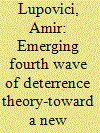

|
|
|
|
|
| Publication |
2010.
|
| Summary/Abstract |
In this paper, I aim to review recent empirical and theoretical developments in the study of deterrence. I suggest that an emerging wave of literature currently represents a revival in this field. However, unlike the previous waves, in which theoretical and empirical questions were studied together (realism and nuclear deterrence), in the emerging deterrence literature these two are isolated from each other. The theoretical trend of this wave is evident in new constructivist and interpretative scholarship that explores the practices of deterrence and has provided significant insights, chiefly with regard to classical empirical questions of state versus state and nuclear deterrence. The empirical trend of this wave can be seen through the work of scholars who are considering how to deter "new" threats-such as terrorism, rogue states, and ethnic conflicts-mainly by incorporating the traditional realist approach to deterrence. By reviewing these two trends in the current wave of deterrence writing, I demonstrate the advantages of each and suggest that the study of deterrence may benefit from their integration.
|
|
|
|
|
|
|
|
|
|
|
|
|
|
|
|
| 6 |
ID:
099112
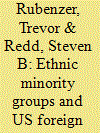

|
|
|
|
|
| Publication |
2010.
|
| Summary/Abstract |
Previous research on the role of ethnic minority interest groups in US foreign policy has resulted in the development of an extensive list of criteria thought to condition ethnic minority influence. Existing case studies, in spite of their significant contribution, leave open the question of which factors, if any, actually drive influence. The result is a foreign policy decision-making puzzle. We know that ethnic minority groups attempt to influence foreign policy. We also know that foreign policy decision makers sometimes choose the option favored by certain ethnic minority groups. What practitioners and scholars alike do not know is whether decision makers make choices because of the efforts of ethnic minority groups. The experimental designs presented in this study offer the opportunity to solve the puzzle by isolating the impact of diasporic interests on foreign policy decision making at the congressional level. Using a hypothetical foreign policy scenario, the study examines the independent and interactive effects of diasporic numerical significance, diasporic mobilization, and cultural similarity on foreign policy decision making. Results indicate that decision makers are highly responsive to diasporic mobilization, but were unresponsive to diasporic numerical significance and cultural similarity. The overall implication is that small, but highly mobilized, ethnic minority interest groups may be able to significantly influence the development of US foreign policy at the congressional level.
|
|
|
|
|
|
|
|
|
|
|
|
|
|
|
|
| 7 |
ID:
099119
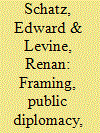

|
|
|
|
|
| Publication |
2010.
|
| Summary/Abstract |
The US State Department increasingly relies on efforts of public diplomacy to improve America's image abroad. We test the theoretical efficacy of these efforts through an experiment. Participants were recruited in Kyrgyzstan and Tajikistan. All but those participants randomly assigned to a control group read a quote about religious tolerance and pluralism in the United States. We varied the attribution of this quote to President Bush, to an unnamed US Ambassador, to an ordinary American, or to no one. We then asked respondents a battery of questions about their opinions of the United States before and after a long discussion with other participants about the United States. We find that the identity of the messenger matters, as those who read the quote attributed to Bush tended to have lower opinions of the United States. After the discussion, these views partially dissipated. Post-discussion views were more heavily influenced by how other participants viewed the United States. After controlling for the source and location of the discussion, when the discussion took place among people with more positive initial views of the United States, views of the United States improved. However, when there was a large range of views in the discussion, post-discussion views of the United States were relatively worse. Based on this study, we suggest new directions for the conduct of public diplomacy.
|
|
|
|
|
|
|
|
|
|
|
|
|
|
|
|
| 8 |
ID:
099103


|
|
|
|
|
| Publication |
2010.
|
| Summary/Abstract |
This paper aims to explore government preferences and cleavages in the bargaining process on the European Constitution, across the range of 25 EU member states. The study focuses on preferences concerning socioeconomic policymaking and explores whether divisions can be discerned between preferences held by actors according to locations on the left-right policy scale, actors in older as compared to newer EU states, net EU budget positions, domestic rates of support for European integration, and smaller as compared to larger states. The analysis also controls for possible external effects, such as recent domestic macroeconomic developments. Negotiations on the European Constitution are found to be determined less by general transnational left-right divisions, but cleavages according to the length of EU membership and the size of EU member states.
|
|
|
|
|
|
|
|
|
|
|
|
|
|
|
|
| 9 |
ID:
099105


|
|
|
|
|
| Publication |
2010.
|
| Summary/Abstract |
Why do some countries protect minority shareholders from rent-seeking by corporate insiders while others do not? To the extent that there has been convergence toward shareholder-friendly laws, what factors have shaped that convergence? We explore this question by examining the worldwide diffusion of insider trading laws through a series of event history analyses. We argue that variation in the adoption and enforcement in insider trading laws can be best explained by the interaction of rising international competitive pressures to attract investment capital through investor-friendly laws and electoral laws that make governments more or less vulnerable to economic voting. We find that governments are more likely to adopt and enforce insider trading laws when they face reelection under electoral laws that make them relatively vulnerable to economic voting and when they face international competitive pressures. Moreover, we find that the impact of domestic political institutions declines in significance as international competitive pressures increase, and vice-versa.
|
|
|
|
|
|
|
|
|
|
|
|
|
|
|
|
| 10 |
ID:
099115
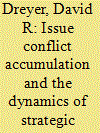

|
|
|
|
|
| Publication |
2010.
|
| Summary/Abstract |
Although states at times contend over a single issue (such as territory), international rivals often contend over multiple issues simultaneously. Issue conflicts tend to accumulate among rivals due to the development of enemy images of the "other," which causes states to view as threatening, behavior that was previously viewed as non-threatening. Once multiple issues are on the agenda, issues become linked as states begin to view the "other" as the main problem in settling all disagreements. Issue accumulation also increases the stakes of rivalry, which likely increases the probability that states will choose to bear the costs of engaging in militarized conflict seeking the settlement of issues in one's favor. An examination of strategic rivals supports the expectations that issue conflict accumulation tends to increase the likelihood of militarized disputes and war. The results also reveal that some paths of issue accumulation, in which certain types of issues come under contention, tend to be more dangerous than others.
|
|
|
|
|
|
|
|
|
|
|
|
|
|
|
|
| 11 |
ID:
099118
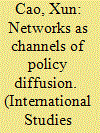

|
|
|
|
|
| Publication |
2010.
|
| Summary/Abstract |
This paper studies policy changes in capital taxation by focusing on policy interdependence induced by network dynamics at the international level. The empirical findings indicate that the competition mechanism induced by network position similarity in the network of portfolio investment and that of exports causes policy diffusion in corporate taxation; the socialization mechanism (policy learning and emulation) induced by network position proximity in the IGO networks also drives policy changes, and the evidence is much stronger in the IGO networks that facilitate policy learning than in those that facilitate emulation. The paper also discusses explicitly empirical challenges to incorporate network characteristics into connectivity matrices in spatial lag models often used to study policy diffusion. It suggests that students of policy diffusion should discuss as explicitly as possible the assumptions and procedures to construct connectivity matrices and present results from alternative specifications: our conclusion on the strength of policy diffusion is often sensitive to the choice of connectivity matrices.
|
|
|
|
|
|
|
|
|
|
|
|
|
|
|
|
| 12 |
ID:
099117


|
|
|
|
|
| Publication |
2010.
|
| Summary/Abstract |
This article is designed to explore the usefulness of an alternative conceptualization of the foreign assistance policy process. The common assumption is that US foreign aid outputs are rationally determined in response to external stimuli such as US security or economic interests or human need in a country. Yet, consistent with the logic of two-level games, foreign aid policy can become ensnared in domestic politics, especially those of a partisan distinction. In this article, I build an interactive model of foreign policy where external stimuli and domestic partisan differences are coupled to explain foreign assistance behavior toward Africa over the fiscal 1982-2003 period. I find that shifts in party control of the Presidency and the Congress lead to different valuations of the importance of external factors in making economic assistance policy. This interaction of domestic and foreign inputs serves to offer a fundamental reassessment of explanations concerning foreign assistance policy specifically, and foreign policy generally.
|
|
|
|
|
|
|
|
|
|
|
|
|
|
|
|
| 13 |
ID:
099102
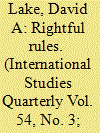

|
|
|
|
|
| Publication |
2010.
|
| Summary/Abstract |
Global governance is an important and increasingly popular topic of inquiry. Nonetheless, existing research remains too statist, privileging states and limiting other forms of governance to the interstices of state power. Drawing on social contract theory, I offer an alternative approach that begins with the central role of authority in political life and develops a synthetic understanding of governance that applies equally to its myriad forms. I argue that we have, as a discipline, relied on a formal-legal conception of authority that is inappropriate to an international setting and has unduly limited enforcement to violence. I propose that global governance and its many forms can be understood and unified by a concept of relational authority, which treats authority as a social contract in which a governor provides a political order of value to a community in exchange for compliance by the governed with the rules necessary to produce that order. This conception of relational authority is followed by three illustrations of its central logic in (i) state-to-state hierarchy by the United States over Caribbean states, (ii) supranational authority by the World Trade Organization over member states, and (iii) private authority by credit rating agencies over corporations and sovereign borrowers. The conclusion outlines the research agenda that follows from this approach.
|
|
|
|
|
|
|
|
|
|
|
|
|
|
|
|
| 14 |
ID:
099121
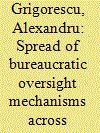

|
|
|
|
|
| Publication |
2010.
|
| Summary/Abstract |
The study asks why so many intergovernmental organizations (IGOs) have established recently offices and policies intended to facilitate the oversight of their bureaucracies. It begins from a set of hypotheses derived from the principal-agent (PA) literature, a natural starting point for answering this question. It then considers explanations based on norms and institutional diffusion to offer a more complete explanation of developments. The study argues that the empowerment of democratic norms and institutional diffusion processes across IGOs have altered member-states' preferences and allowed them to overcome collective action problems involved in the adoption of oversight mechanisms. The hypotheses are tested across more than 70 organizations. The results suggest that arguments extracted from the PA literature and the one on norms allow us to understand which IGOs are more likely to have bureaucratic oversight mechanisms. On the other hand, models that also take into account diffusion processes allow us to understand better when such mechanisms are adopted.
|
|
|
|
|
|
|
|
|
|
|
|
|
|
|
|
|
|
|
|
|